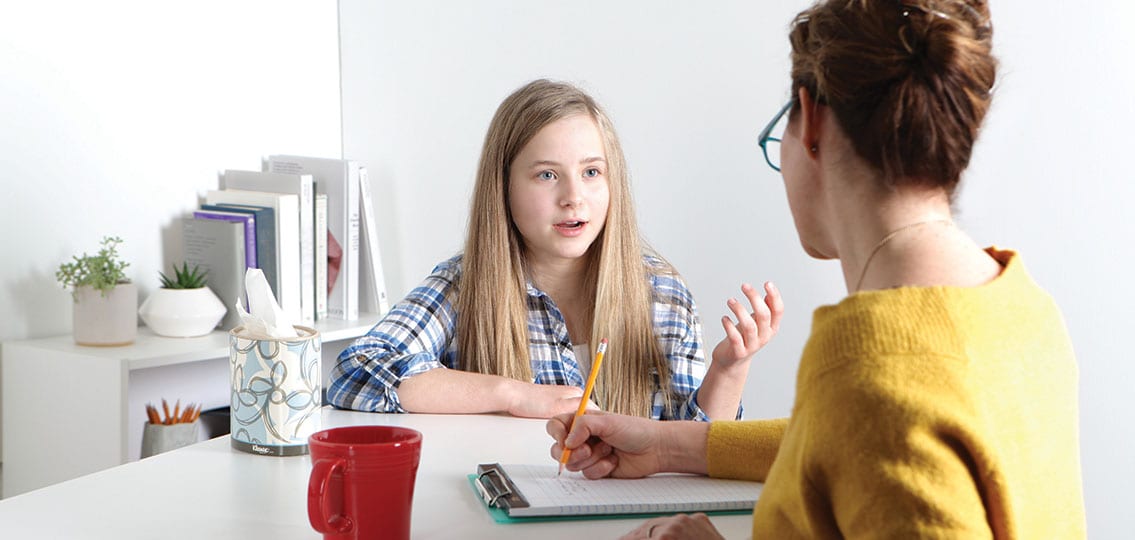Exactly How Young Adult Treatment Can Equip Young Minds and Advertise Development
Teen treatment plays a critical function in forming the psychological wellness of teens. It resolves the unique challenges they encounter, cultivating psychological recognition and strength. By checking out various healing techniques, young people can develop vital coping techniques. This procedure not only aids in individual growth yet also enhances their capacity to browse connections. Comprehending the dynamics of this restorative trip reveals deeper insights into just how it can essentially change their path toward adulthood.
Comprehending the Relevance of Mental Wellness in Teenagers
Why is psychological health and wellness important for young adults throughout their formative years? This duration is noted by rapid physical, emotional, and cognitive modifications. Teens usually navigate complicated social dynamics, academic pressures, and the quest for identity, making psychological wellness a vital element of their overall well-being. Healthy mental states allow young adults to develop durability, grow self-esteem, and manage anxiety successfully. Dealing with psychological wellness issues early can prevent long-lasting emotional complications, enabling teens to flourish academically and socially.
Comprehending psychological health in teens involves acknowledging the distinct obstacles they face. Awareness and support can cultivate open communication, allowing young people to reveal their feelings and look for aid when required. By prioritizing mental health, culture can equip teens to develop coping strategies, develop healthy and balanced partnerships, and achieve their full capacity. Ultimately, supporting mental health during these developmental years lays the structure for a well balanced, meeting their adult years.
Usual Difficulties Faced by Teens
Teens often experience various obstacles that can significantly impact their psychological wellness. Psychological guideline struggles, peer pressure characteristics, and academic anxiety administration are usual concerns that form their experiences. Addressing these difficulties is critical for promoting strength and empowerment in teens.
Emotional Policy Battles
Many teens encounter substantial emotional regulation has a hard time as they navigate the complexities of adolescence. This developmental phase is noted by varying emotions, commonly causing trouble handling sensations such as stress and anxiety, anger, and sadness. Young people may find themselves bewildered by their psychological actions, leading to impulsive habits or withdrawal. Variables such as hormonal modifications, social pressures, and academic challenges intensify these struggles. Many teens do not have the coping methods necessary to share their emotions suitably, which can result in conflicts in relationships and hinder personal development. Furthermore, feelings of isolation may emerge, as they typically think their experiences are special. Acknowledging and attending to these emotional regulation concerns with therapy can equip teenagers to develop healthier coping devices and foster strength.
Peer Stress Characteristics
Navigating the psychological turbulence of adolescence typically brings teens face-to-face with peer pressure dynamics. This powerful influence can considerably form their options, habits, and self-image. Teens may really feel urged to comply with their peers' assumptions, causing risky behaviors, such as compound use or undesirable relationships. The need for approval and worry of rejection intensify these pressures, frequently causing inner problem. Young adults may struggle to assert their originality, fearing reaction from their peer groups. Therapy can supply a risk-free room for young individuals to check out these characteristics, allowing them to create strategies for resisting negative influences (therapist for teens near me). With empowerment and self-awareness, teens can find out to browse peer stress much more effectively, cultivating durability and advertising healthier decision-making

Academic Anxiety Administration
Exactly how do academic stress impact the health of teens? For lots of teens, the pursuit of high qualities and college readiness usually causes frustrating stress. This stress and anxiety materializes in numerous methods, including anxiety, clinical depression, and physical wellness problems. The worry of failing and the relentless competitors can create a hazardous environment that impedes emotional and social growth. In addition, impractical expectations from moms and dads and teachers can worsen sensations of insufficiency. Young adults may battle to balance academics with extracurricular activities, better magnifying their stress levels. Efficient scholastic anxiety monitoring methods, such as time monitoring, leisure methods, and looking for support, end up being crucial. By addressing these challenges, therapy can encourage teenagers to establish much healthier coping systems, promoting strength and advertising total well-being.
The Function of Therapy in Adolescent Advancement
As adolescents transition with the intricacies of teen years, treatment becomes a vital assistance system, fostering emotional resilience and individual development. Throughout this formative duration, teenagers come to grips with identity, peer pressure, and emotional upheaval. Treatment offers a safe area for them to explore their feelings, ideas, and behaviors without judgment. This expedition boosts their self-awareness, allowing them to comprehend their emotions and responses a lot more deeply.
Treatment assists adolescents create dealing approaches to manage anxiety and anxiety, important abilities that will certainly profit them throughout life (therapist for teens near me). By involving in healing discussions, young adults discover to verbalize their needs and establish healthier partnerships. This process not just promotes individual growth but additionally adds to far better communication and dispute resolution abilities. Eventually, therapy functions as an essential device in directing sites teenagers towards favorable advancement, equipping them to navigate the challenges of adolescence with confidence and strength
Strategies Made Use Of in Young Adult Therapy
In teenager therapy, various methods are employed to promote empowerment and personal growth. Cognitive Behavior Methods concentrate on reshaping adverse idea patterns, while Meaningful Arts Therapies encourage self-discovery through imaginative expression. With each other, these techniques supply adolescents with beneficial tools to navigate their psychological and psychological difficulties.
Cognitive Behavior Techniques
Cognitive Behavioral Techniques (CBT) play an important role in teenager treatment, especially as they deal with the one-of-a-kind obstacles dealt with throughout teenage years. These methods focus on recognizing and modifying negative idea patterns that add to emotional distress and behavior concerns. By motivating teenagers to recognize illogical beliefs and change them with useful ideas, CBT promotes durability and coping strategies. Specialists typically use devices such as idea documents, behavior experiments, and exposure tasks to aid adolescents confront their anxieties and create healthier actions. CBT emphasizes goal-setting, which encourages teenagers to take possession of their progression. This structured method not only reduces symptoms of stress and anxiety and clinical depression yet additionally equips young people with skills to navigate life's challenges a lot more properly.
Meaningful Arts Therapies
While traditional talk treatments might not reverberate with every teen, Meaningful Arts Therapies use an alternative method that utilizes imagination as a means of self-expression and healing. This approach integrates various art kinds, including paint, songs, drama, and dancing, enabling adolescents to communicate emotions and experiences that might be hard to verbalize vocally. Involving in these creative procedures can foster self-discovery, boost self-confidence, and help with emotional handling. Furthermore, the non-judgmental environment of expressive arts permits young adults to explore their identifications and handle obstacles in a supportive setting. By integrating expressive arts right into treatment, specialists can supply an all natural approach that not just addresses psychological struggles however additionally encourages young minds to prosper and expand.
Building Strength With Restorative Practices
As adolescents browse the complexities of their developing years, constructing strength with therapeutic methods becomes vital for their emotional wellness. Reliable healing techniques, such as cognitive-behavioral treatment and mindfulness methods, equip teenagers to challenge challenges and create dealing strategies. By discovering to recognize and manage their feelings, young people can grow a higher feeling of self-efficacy.

Taking part in treatment allows teenagers to explore their More Help thoughts and sensations in a risk-free setting, advertising flexibility in the face of misfortune. This procedure motivates them to see setbacks as opportunities for growth as opposed to overwhelming challenges. Team therapy settings additionally boost resilience by cultivating social connections and giving peer support, strengthening the concept that they are not alone in their battles.
Eventually, healing techniques act as vital devices, gearing up teens with the abilities necessary to navigate life's obstacles and arise more powerful and more resilient in their trip towards adulthood.
The Long-Term Benefits of Engaging in Therapy
Participating in treatment throughout teenage years can generate substantial long-lasting advantages that expand well into adulthood. By attending to psychological and emotional obstacles early, young adults can establish healthier coping systems that continue throughout their lives. Therapy promotes self-awareness, encouraging young people to recognize their ideas and my sources sensations better, which can lead to improved decision-making abilities.
Regular healing interaction can improve interpersonal partnerships. Teens typically discover effective communication and conflict-resolution techniques, which can enhance connections with peers, family members, and future coworkers. This structure of emotional intelligence usually causes raised strength versus anxiety and misfortune.
Furthermore, individuals who join treatment during their formative years might experience lowered dangers of mental health and wellness concerns later on in life. Eventually, very early therapeutic treatment outfits teens with crucial tools for navigating life's complexities, promoting both personal growth and total health as they transition into their adult years.
Often Asked Questions

How Can Moms And Dads Assistance Their Teenagers Throughout Treatment Sessions?
Parents can sustain their teens during therapy sessions by proactively paying attention, respecting their personal privacy, urging open communication, and verifying their sensations. They need to additionally remain patient and understanding as their teens browse the healing process.
What Should a Young adult Expect in Their Initial Therapy Appointment?
In their initial treatment consultation, a teen can anticipate an introductory conversation, discussing their sensations and concerns. The therapist will certainly create a risk-free environment, establish objectives, and discuss discretion to foster depend on and visibility.
Are There Age Boundary for Teenagers Looking For Therapy?
There are normally no rigorous age limits for teenagers looking for treatment; however, services might differ by supplier - counselling for teens. Many specialists take into consideration clients aged 13 to 19, while more youthful children may call for adult participation or alternative resources
Exactly How Can Teenagers Discover a Specialist They Get in touch with?
Teens can locate a therapist by looking for recommendations from trusted grownups, researching on the internet directory sites, or utilizing school sources. Structure rapport with preliminary consultations helps make sure a comfy connection, important for efficient therapy and personal growth.
Is Online Therapy Effective for Teenagers?

Online treatment can be reliable for teens, supplying versatility and ease of access. Numerous young individuals value the convenience of virtual sessions, which can enhance visibility and facilitate communication, eventually adding to their psychological wellness and personal development.
Teen therapy plays an essential role in shaping the mental well-being of adolescents. In teenager therapy, various strategies are used to cultivate empowerment and individual growth. Cognitive Behavioral Techniques (CBT) play a crucial duty in young adult therapy, particularly as they resolve the special challenges dealt with during teenage years. While typical talk therapies may not reverberate with every teen, Meaningful Arts Therapies provide a different method that uses imagination as a way of self-expression and healing. Effective therapeutic approaches, such as cognitive-behavioral treatment and mindfulness methods, encourage young adults to confront challenges and establish dealing techniques.